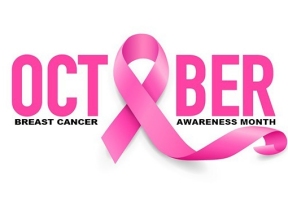By: Ashmar Mandou
 You know this is the time of year when we are surrounded by tons of information about breast cancer. Some good, some bad. The internet can be a huge help, but it is also filled with myths about breast cancer. And while your friends and family members have the best intentions to give you information to protect you, not everything you hear is true. Sometimes it’s hard to tell the difference between the good and the bad. Here, we tackle a few of the most common myths about breast cancer with help from the American Cancer Society.
You know this is the time of year when we are surrounded by tons of information about breast cancer. Some good, some bad. The internet can be a huge help, but it is also filled with myths about breast cancer. And while your friends and family members have the best intentions to give you information to protect you, not everything you hear is true. Sometimes it’s hard to tell the difference between the good and the bad. Here, we tackle a few of the most common myths about breast cancer with help from the American Cancer Society.
MYTH: If I don’t have a family history of breast cancer, I won’t get it.
FACT: Most people diagnosed with breast cancer have no known family history.
Many people think of breast cancer as an inherited disease. But only about 5–10 percent of breast cancers are believed to be hereditary, meaning they’re caused by abnormal changes (or mutations) in certain genes passed from parent to child. The vast majority of people who get breast cancer have no family history, suggesting that other factors must be at work, such as environment and lifestyle. But doctors often can’t explain why one person gets breast cancer and another doesn’t. The biggest risk factors are simply being a woman and growing older. Over time, healthy breast cells can develop mutations on their own, eventually turning into cancer cells. Still, if you have a strong family history of breast cancer on either your mother’s or your father’s side, this is an important risk factor that should be taken seriously.
MYTH: Consuming too much sugar causes breast cancer.
FACT: There is no evidence that sugar in the diet causes breast cancer.
Not just with breast cancer but with all types of cancer, there’s a common myth that sugar can feed the cancer and speed up its growth. All cells, whether cancerous or healthy, use the sugar in the blood (called glucose) as fuel. While it’s true that cancer cells consume sugar more quickly than normal cells, there isn’t any evidence that excessive sugar consumption causes cancer. There was a study in mice that suggested excess sugar consumption might raise the risk of breast cancer, but more research is needed to establish any link in animals as well as in people. That said, we do know that eating too much sugar can lead to weight gain, and being overweight is an established risk factor for breast cancer.
MYTH: Breast cancer always causes a lump you can feel.
FACT: Breast cancer might not cause a lump, especially when it first develops.
People are sometimes under the impression that breast cancer always causes a lump that can be felt during a self-exam. They might use this as a reason to skip mammograms, thinking they’ll be able to feel any change that might indicate a problem. However, breast cancer doesn’t always cause lumps. By the time it does, the cancer might have already moved beyond the breast into the lymph nodes. Although performing breast self-exams is certainly a good idea, it isn’t a substitute for regular screening with mammography.










